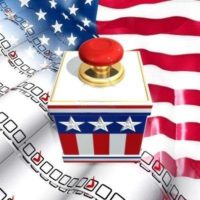
Video and photos from the news conference area available here.
News release from the Allen County Democratic Party:
Jack Morris, Deputy Chair of the Allen County Democratic Party Announced a Celebration of the 50th Anniversary of the Voting Rights Act
(August 4, 2015) – Jack Morris, Deputy Chair of the Allen County Democratic Party announced a celebration of the 50th anniversary of the Voting Rights Act will take place at Parkview Field – Home of the Fort Wayne Tincaps on Thursday, August 6, 2015 at 6:30 PM with free admission and free parking in the Silver lot. The non-partisan event is being supported by numerous local organizations including both the Allen County Democratic and Republican Parties; The Martin Luther King, Jr. Club; United Auto Workers Local 2209 Civil Rights Committee; Northeast Indiana Central Labor Council of the AFL-CIO; Allen County chapter of the Indiana African-American Democratic Caucus; League of Women Voters of Fort Wayne; Ft. Wayne Urban League; A. Phillip Randolph Institute; and The Northeast Indiana Building Trades.
Morris stated, “One time when we are all really equal in this country is in the voting booth. Voting is the most direct way an individual can have a voice in our government. Various groups have fought hard for the right to vote. We join to celebrate this Act which was intended to open the door to that right.”
Speakers listed for the event include: Mayor Tom Henry; Clifford F. Buttram, Jr., of The Martin Luther King, Jr. Club; Dr. John Aden, Executive Director of the African/African-American Historical Society; Larry Lee, business leader and civil rights activist; Rev. Bill McGill, pastor and civil rights activist who participated in the march in Selma, Alabama; and Ft. Wayne Police Chief, Garry Hamilton.
The announcement provided historical background regarding voting rights in the United States which prompted the passage of the Act. Specifically:
In 1870, after the Civil War, the 15th amendment guaranteed the right to vote to all male citizens regardless of race, color, or previous condition of servitude. However, women and most Native Americans were not yet included. Women, after a long hard fight, won the right in 1920 with the passage of the 19th Amendment. Most Native Americans were still excluded until the Indian Citizenship Act of June 24, 1924.
Following the passage of the 15th Amendment and the American Citizenship Act, various discriminatory practices were used to prevent both African Americans and Native Americans from voting. States used taxation saying those who do not pay taxes could not vote. Voting taxes were actual imposed to prevent those who could not afford them from voting. Native Americans and African-Americans were called incompetent based upon the lack of ability to read and were subjected to tests. Locations and the number of polling places were also used to make it difficult for minorities to vote and many arriving at a polling place were told they were at the wrong place.
The civil rights movement of the 1950s and 60s raised the struggle of minorities’ voting rights. However, voting rights activists were subjected to mistreatment and violence. One event turned the tide. On March 7, 1965 peaceful marchers for voting rights in Selma, Alabama were attacked by Alabama troopers. Some were severely beaten. Due to the fact this was on national television there was a cry of outrage giving an opening for action.
The following week, President Johnson made a speech to Congress outlining the ways some election officials denied African-American the vote and called for a bill to eliminate those practices.
The voting rights bill passed overwhelmingly in the Senate and the House of Representatives. President Johnson signed the Voting Rights Act into law August 6, 1965 with Martin Luther King Jr. and other civil rights leaders present.
Although not widely discussed, the Voting Rights Act of 1965 included American Indians and has helped protect their rights. Since its passage, the Act has been amended to include such features as the protection for non-English fluent American citizens. Therefore the Act is available to protect immigrants and refugees who have chosen to become citizens of the United States.
Recently there has been a resurgence of laws placing restrictions or conditions on the right to vote. Further, in 2013 the U.S. Supreme Court outlawed a part of the law that required states with a history of discrimination at the polls to “preclear” changes to voting laws with the federal government before implementing them. Following this decision several states who would have been covered have pushed voting laws some contend are designed to restrict voter participation, particularly of minorities. In response the Voting Rights Advancement Act of 2015 has been filed to restore enforcement efforts. Among other things, it would require greater transparency in elections so voters are made aware of changes to voting laws and would set up a new formula requiring jurisdictions with a persistent record of violations to preclear changes to voting laws.
Unfortunately, although the fight for voting rights is a valuable fight, voter apathy has put into question the value of the return. General election voter turnout for the 2014 midterms was the lowest it’s been in any election cycle since World War II. Indiana had the lowest turnout rate, with just 28 percent of eligible voters participating. In the most recent local primary election only 9.8% of eligible voters bothered to vote, a record low. Morris said, “Such a turnout is an insult to those who put their lives on the line to gain the right. Simply put, a Constitutional amendment can grant the right and a Voters Right Act can give all the protection in the world but neither will have accomplished anything if those eligible do not exercise their right to vote. Hopefully, celebrating this Act and the price paid will remind people of the importance of voting.”















